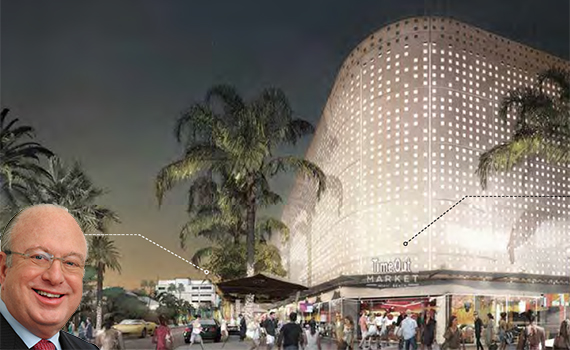After more than two hours of contentious debate, the Miami Beach Historic Preservation Board on Monday allowed the developer to apply for permits for the proposed Time Out Market at 1601 Drexel Avenue, on the ground floor of a parking garage, just around the corner from Lincoln Road.
Earlier this month the city’s planning board approved a conditional use permit for the site, but their approval was based on limiting outdoor seating to 120 seats and restricting operating hours to 11 p.m. for outdoor seating on Friday and Saturday while allowing a 2 a.m. indoor weekend closing time. Outdoor seating will close at 10 p.m. during weekdays with a midnight indoor closing time. Additionally the planning boards banned any outdoor speakers, and live musical performances, and required that indoor music be kept to “ambient levels.”
Tuesday’s historic preservation board meeting was to review plans for the facility, and approve interior modifications that will allow the developer, 420 Lincoln Road Development LLC, to install terrazzo countertops near large windows, allowing people walking by to see artisanal food preparers at work.
Time Out is planning for indoor seating for 400 with 11 food kiosks to be staffed by up-and-coming Miami chefs who would lease space at the market to showcase their talents for about six months to a year, ideally as a first step to opening a restaurant of their own.
But several board members said while they understood the planning board oversees operational uses of a building, they objected to the proposed closing times, saying they should be scaled back to midnight.
The building is zoned CD-3 which allows for commercial high density. But it sits across from residential buildings zoned RM-1, and one local resident, Adam Shedroff, who owns rental property on Drexel Avenue expressed concerns about late night noise and loitering from patrons of the market. Those concerns were echoed by several board members and by Daniel Ciraldo of the Miami Design Preservation League who said when the building was built in 2009, owners agreed to limit seating at the space under the garage to 150 seats.
“It feels like bait and switch or a Trojan horse,” he told the board. Ciraldo told The Real Deal his organization could take the issue to court. “It’s so important to maintain the integrity of these historic neighborhoods. If they can’t sleep there, and can’t live there, it’s going to affect the viability of these structures,” he said.
While nearly all members of the historic preservation board expressed concerns about the potential for disruption to the neighborhood because of a 2 a.m. weekend closing time, they agreed to heed the advice of board chairman Stevan Pardo “to be respectful of the planning board.” While they approved the certificate of appropriateness by a 4-3 vote, they said they would continue to review the project and pass any recommendations governing the use of the facility to the planning board.
Time Out Market will be the first large food hall to open in Miami Beach. Designed by Miami Beach firm Urban Robot, the market will feature an open hall with communal tables. The firm says it plans to have Time Out Market open in time for this year’s Art Basel in early December.
Monika Entin, an attorney for Paul Cejas who owns the building, told the board her client has been searching for several years for “a tenant that can operate successfully off of Lincoln Road.” Cejas moved to Miami from Cuba in the 1960’s and founded one of the country’s largest Hispanic-owned businesses, CareFlorida Health Systems before selling the company in 1994 for $250 million. Cejas who owns several properties on Miami Beach including 420 Lincoln Road served as U.S. ambassador to Belgium in the Clinton administration.
